Children hospitalized for whooping cough increase
Currently, the Northern region is experiencing erratic weather changes, sometimes hot, sometimes cold, creating favorable conditions for pathogens to develop, spread and increase the risk of infectious diseases, especially respiratory diseases.
According to information recorded from the national infectious disease surveillance system, from the beginning of 2024 until now, the whole country has recorded nearly 70 cases of whooping cough , mainly in some provinces and cities in the Northern region. In addition, many cases of measles, rash fever suspected of measles and chickenpox have also been recorded sporadically in many places.
According to the reporter's records at the Tropical Disease Center, National Children's Hospital, there are currently many children with whooping cough with complications being actively cared for and treated by doctors.
Sitting and taking care of her 2-month-old daughter, Ms. DQC ( Nghe An ) said that before going to the hospital, the baby coughed a lot, wheezed, then had a high fever, had phlegm and was fussy. Due to an underlying disease (congenital metabolic disorder), the family took the baby to the National Children's Hospital. Here, after examination, the doctors diagnosed that the baby had whooping cough.
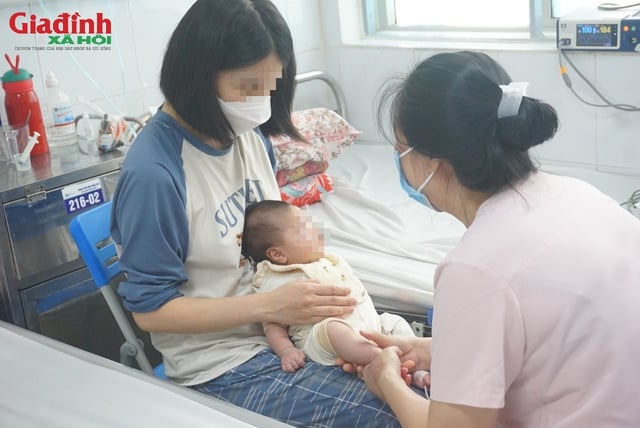
According to doctors, children with whooping cough are mainly children under 3 months old, those who have not been vaccinated or have only received one dose of whooping cough vaccine. Photo: N.Mai
Another case that is also being treated for whooping cough is baby MQ (Cau Giay, Hanoi ). The baby's mother said that her son is just over 1 month old and has not been vaccinated against whooping cough. The baby was admitted to the hospital with wheezing, wheezing, refusing to breastfeed and fatigue.
In addition to the two newborn cases, the Tropical Disease Center is also treating several older children, including an 11-year-old girl (Gia Lam, Hanoi). According to her family, the child had been coughing for 5 days, and despite buying cough medicine for her to take, it did not go away. After being admitted to the hospital, she was diagnosed with whooping cough and treated by doctors, the child's cough has decreased and her health has gradually stabilized.
Dr. Nguyen Van Lam, Director of the Tropical Disease Center, National Children's Hospital, said that since the beginning of the year, the Center has received about 40 cases of whooping cough. Most of the patients have complications of pneumonia. Currently, 7 patients with complications are still being monitored and treated here.
" Most of the whooping cough cases this year are children under 3 months old and have not been vaccinated or have only received one dose. There are also a few cases that have received the three basic doses but have not received the booster. Some cases have not received the shots because they were sick when the vaccination schedule was due, " said Dr. Lam.
According to Dr. Nguyen Van Lam, 2019 was considered a whooping cough epidemic with more than 400 cases hospitalized for treatment. In the following years, the number of whooping cough cases decreased significantly, from a few to a few dozen cases a year. However, since the beginning of the year, the number of whooping cough cases has skyrocketed to 40 cases. Of which, Hanoi has 24 cases. This expert further emphasized that this year, the rate of whooping cough patients has increased sharply and may be equivalent to 2019.
Be careful of children with serious complications from whooping cough.
Dr. Do Thi Thuy Nga, Deputy Head of the Department of General Internal Medicine, Center for Tropical Diseases, National Children's Hospital, said that whooping cough is an infectious disease that can occur at any age, especially the highest incidence rate is in children who have not been vaccinated or are not yet old enough to be vaccinated, such as children under 2 months old.
However, the Tropical Disease Center also recorded that about 5-10% of hospitalized children are older children, especially school-age children. Because this age group has not been vaccinated against whooping cough, the risk of disease increases.
For example, in the case of the 11-year-old girl above, according to Dr. Nga, the family said that the child had been fully vaccinated for the first two years of her life. However, after that, there was no booster shot. This could be the factor that caused the child to get sick.
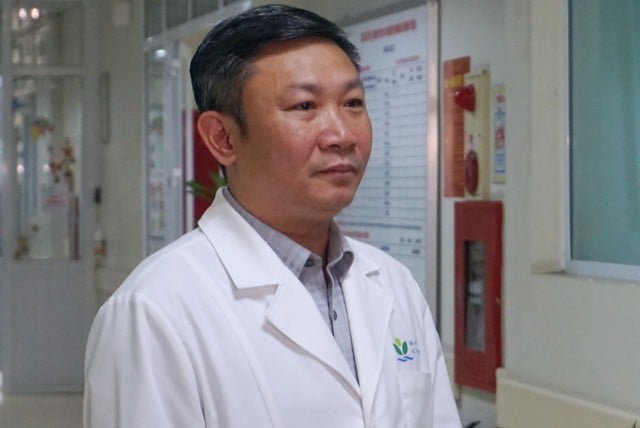
Dr. Nguyen Van Lam, Director of the Center for Tropical Diseases, National Children's Hospital, said that this year the rate of patients with whooping cough has increased sharply, possibly equivalent to 2019. Photo: N.Mai
According to Dr. Nguyen Van Lam, children with whooping cough often start with coughing fits, then cough more severely, cough weakly, may have cyanosis, stop breathing during the attack. After the coughing fit, the child appears to wheeze, wheeze in. In some cases, the child coughs and vomits food and sticky white phlegm, making the child very tired and uncomfortable. The cough continues like that, lasting 1, 2 months or even 3 months, making the child eat less, stop breastfeeding and can cause malnutrition in the child.
According to Dr. Nguyen Van Lam, whooping cough is a highly contagious disease that can last more than 20 days if not treated. If the patient is treated, the rate of transmission from one patient to another is only about 5 days. Normally, a course of treatment for whooping cough lasts from 7 to 10 days. After that, treatment will be according to the doctor's prescription. In cases with severe complications, the treatment time will be longer.
Accordingly, complications of whooping cough include pneumonia, which can be caused by whooping cough or secondary infection, especially when children inhale food residue or inhale phlegm back into the lungs. In addition, children may experience pulmonary hypertension or complications of encephalitis and meningitis due to whooping cough. In particular, children under 3 months of age are the group with the highest risk of complications.
What to do to prevent whooping cough in children?
According to doctors, whooping cough is a dangerous infectious disease but can be prevented by vaccination. Parents need to vaccinate their children against whooping cough when they are 2 months old and then give them 2 more shots (when they are 3 and 4 months old), each shot 1 month apart. When the child is 18 months old, give them a booster shot. Then, when they are 3-5 years old, give them another shot.
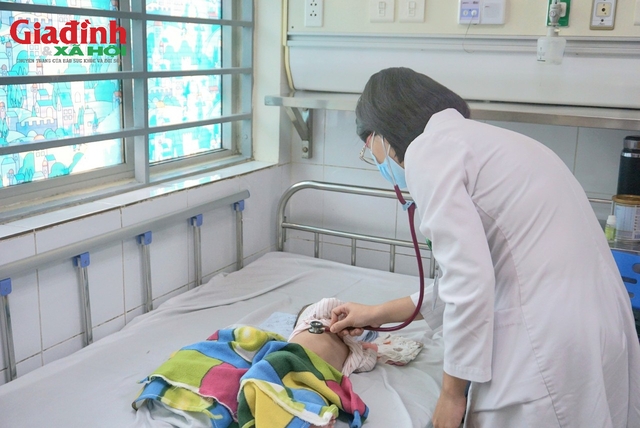
Children with whooping cough are being treated at the Tropical Disease Center, National Children's Hospital. Photo: N.Mai
Vaccination against whooping cough is recommended during adolescence or before giving birth. This not only protects the mother but also has the potential to protect the baby at birth, reducing the risk of whooping cough.
According to Dr. Nguyen Van Lam, whooping cough and some vaccine-preventable diseases will reappear every 3-5 years for many reasons. The most subjective of which is due to incomplete vaccination or the subjective awareness of parents that "it's okay not to vaccinate".
" The most important thing to prevent infectious diseases that have vaccines is to fully vaccinate with basic doses, then give booster shots according to the schedule recommended by the World Health Organization and the Ministry of Health ," the Director of the Center for Tropical Diseases, National Children's Hospital, recommended.
In addition to whooping cough vaccination, according to doctors, to protect children's health, parents should teach children to wash their hands regularly with soap, cover their mouths when coughing or sneezing; keep their bodies, noses, and throats clean every day; ensure a clean home; limit children from going to crowded places, and avoid contact with people with respiratory diseases, especially whooping cough patients...
Strengthening the prevention and control of whooping cough and other vaccine-preventable diseases
To proactively prevent and control whooping cough and vaccine-preventable diseases, the Department of Preventive Medicine, Ministry of Health has sent an Official Dispatch to the Departments of Health of provinces and centrally-run cities requesting localities to strengthen monitoring, testing, and early detection of cases of whooping cough and vaccine-preventable diseases in the community and medical examination and treatment facilities; and thoroughly handle newly emerging outbreaks.
Perform well the work of admitting, treating, rescuing patients, controlling infections and preventing cross-infection in medical examination and treatment facilities. Closely coordinate with the Institutes of Hygiene and Epidemiology, Pasteur to analyze the situation and assess risks to propose and implement appropriate and timely anti-epidemic measures.
In addition, promote regular vaccination for subjects under the EPI Program to ensure safety and effectiveness; review and organize catch-up vaccinations and catch-up vaccinations for subjects who have not been vaccinated or have not received enough doses, especially during times of interrupted vaccine supply.
Strengthen communication about the risk of disease and measures to prevent whooping cough and vaccine-preventable diseases so that people can proactively prevent the disease; encourage families to vaccinate their children fully and on schedule and encourage vaccination for pregnant women.
In addition, instruct educational institutions, especially kindergartens, preschools, and nurseries to implement disease prevention and control activities such as ensuring clean, airy classrooms and adequate lighting; practicing good personal hygiene, regularly washing hands with soap and clean water; closely monitoring students' health, promptly detecting cases with signs of suspected illness and notifying medical facilities for timely coordination and handling...
Organize inspection teams and promptly direct disease prevention work, focusing on areas with recorded cases of the disease, localities with low vaccination rates, and poor management of vaccination subjects to proactively prevent outbreaks of whooping cough and vaccine-preventable diseases.
Source


![[Photo] Keep your warehouse safe in all situations](https://vphoto.vietnam.vn/thumb/1200x675/vietnam/resource/IMAGE/2025/10/1/3eb4eceafe68497989865e7faa4e4d0e)



![[Photo] Hanoi morning of October 1: Prolonged flooding, people wade to work](https://vphoto.vietnam.vn/thumb/1200x675/vietnam/resource/IMAGE/2025/10/1/189be28938e3493fa26b2938efa2059e)
![[Photo] President of the Cuban National Assembly visits President Ho Chi Minh's Mausoleum](https://vphoto.vietnam.vn/thumb/1200x675/vietnam/resource/IMAGE/2025/10/1/39f1142310fc4dae9e3de4fcc9ac2ed0)
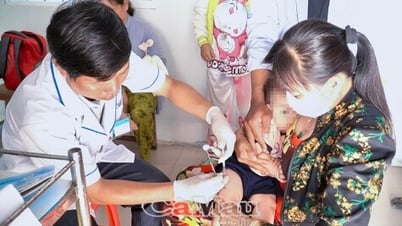




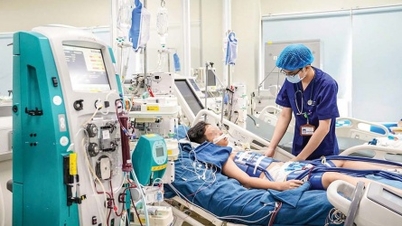




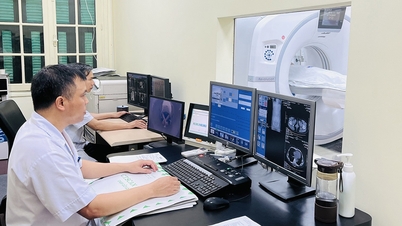




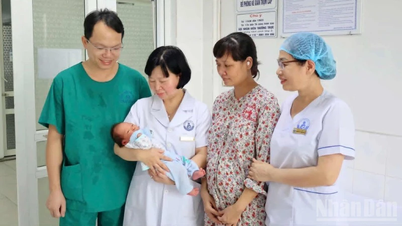

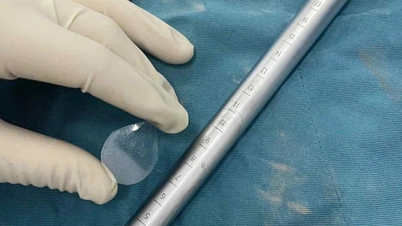















































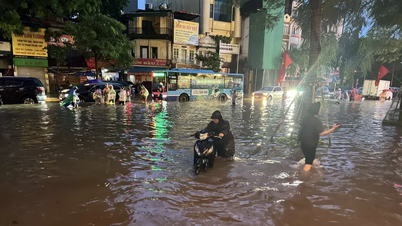







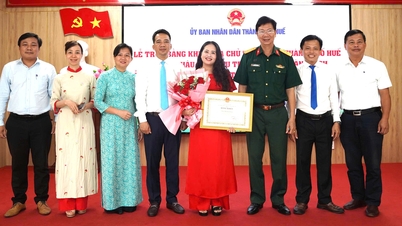













Comment (0)